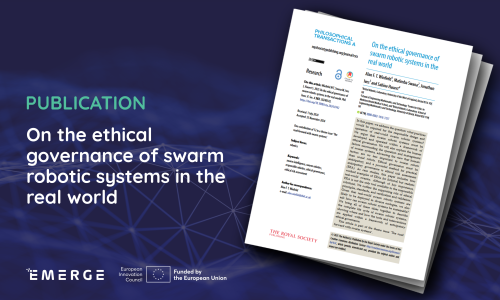30 January 2025


Swarm robotics is a growing approach to the coordination of multi-robot systems. Unlike traditional multi-robot systems that use centralized or hierarchical control and communication systems to coordinate robots’ behaviours, swarm robotics adopts a decentralized approach. In this approach the desired collective behaviours emerge from the local interactions between robots and their environment. Such emergent or self-organised collective behaviours are inspired by—and in some cases directly modelled on—the swarm intelligence observed in social insects.
The potential for swarm robotics is considerable. Any task in which physically distributed objects need to be explored, surveyed, collected, harvested, rescued or assembled into structures is a potential real-world application for swarm robotics. Application domains include search and rescue, precision agriculture, environmental monitoring, logistics and—using nanorobots—cancer treatment.
In this work, EMERGE partners from the University of Bristol address the question: what practices would be required for the responsible design and operation of real-world swarm robotic systems? The authors argue that swarm robotic systems must be developed and operated within a framework of ethical governance. They explore the human factors surrounding the operation and management of swarm systems, advancing the view that human factors are no less important to swarm robots than social robots. Ethical governance must be anticipatory, and a powerful method for practical anticipatory governance is ethical risk assessment (ERA). As case studies, this paper includes four worked examples of ERAs for fictional but realistic real-world swarms. Although of key importance, ERA is not the only tool available to the responsible roboticist. The group outlines the supporting role of ethical principles, standards, and verification and validation. Given that real-world swarm robotic systems are likely to be deployed in diverse ecologies, we also ask: how can swarm robotic systems be sustainable? They bring all of these ideas together to describe the complete life cycle of swarm robotic systems, showing where and how the tools and interventions are applied within a framework of anticipatory ethical governance.
Read the paper in the link below.


